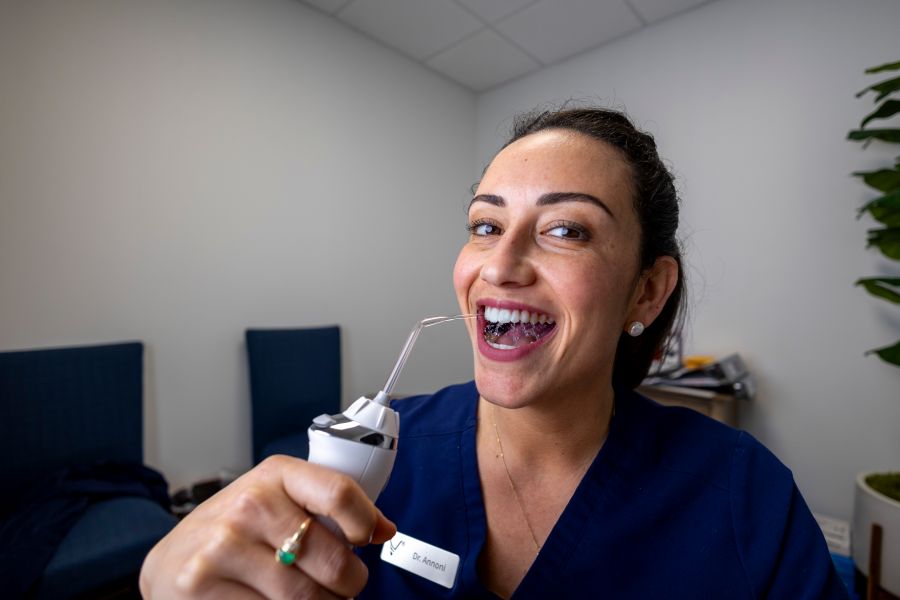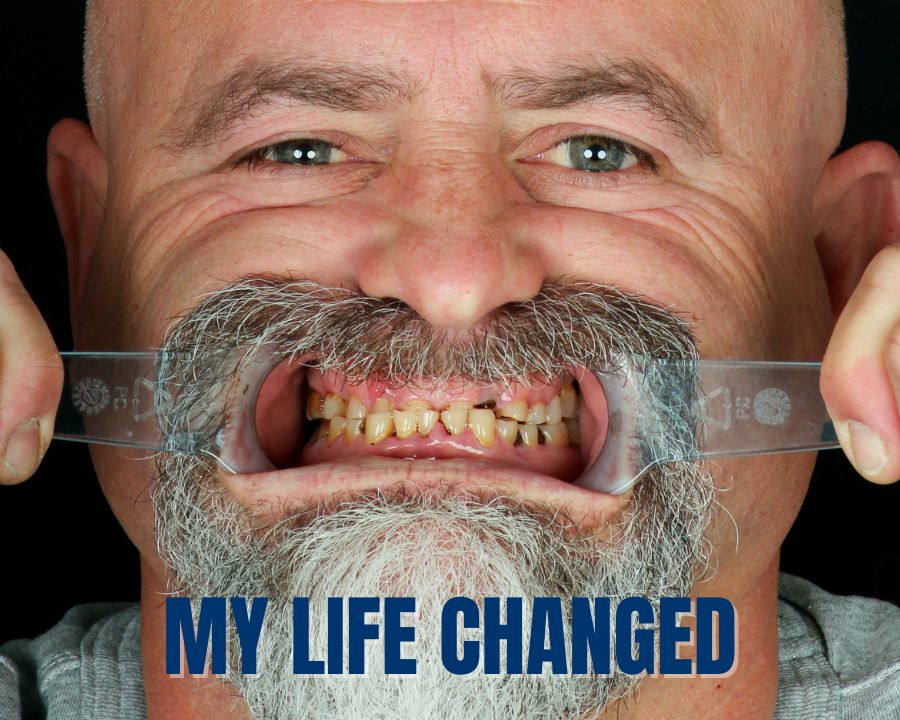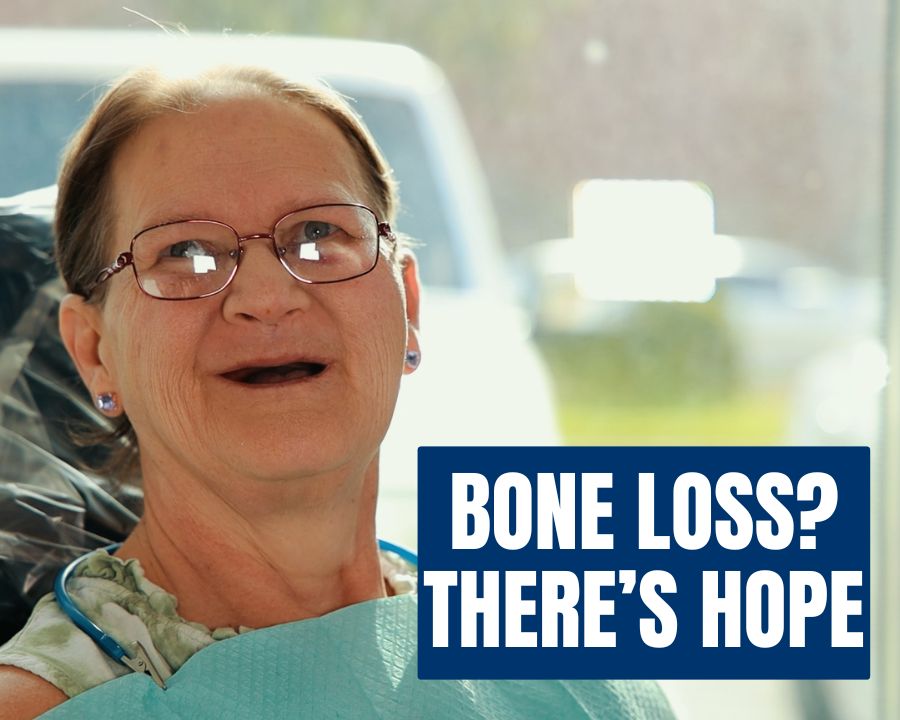Do dental implants cause bad breath? It’s a common question—and a valid one.
If you’ve been living with bad breath tied to missing or failing teeth, the idea of dental implants might feel like a fresh start. But what if the problem sticks around? Or even comes back in a different way?
Here’s the truth: dental implants themselves don’t cause bad breath—but there are real reasons why someone with implants might still struggle with odor. And just as important… there are ways to prevent it entirely.
In this article, we’ll break down what really causes bad breath (with or without implants), how to keep your mouth healthy long-term, and why some patients—like Tony—saw their chronic bad breath vanish almost overnight after getting implants.
Let’s start with his story.
How Dental Implants Helped Tony’s Bad Breath
*Actual NUVIA patient(s) who may have been compensated for sharing their story. Not all those who come in for a consultation are eligible for this treatment. Results may vary in individual cases.
Tony’s story started the way it does for many people: with years of dental pain, shame, and breath that no amount of gum or mouthwash could cover.
What he didn’t expect was how his failing teeth were affecting the rest of his body.
With overcrowding, cavities that never went away, and needing to have a cyst removed from his gums, Tony struggled with his oral health. Unfortunately, over the years Tony endured unkind comments about his teeth.
“People are pretty blunt… I had comments every once in a while on bad breath, crooked teeth, you know. So I definitely learned to smile and keep my mouth shut so people couldn't see how bad my teeth were.”
But his mouth wasn’t the only thing people noticed.
As a construction worker and race car driver in Arizona, Tony was used to hot, sweaty work. However, after some time he noticed that his body odor wasn’t normal, even with the sweltering weather.
He explained, “My normal activity was to take an extra shirt or two with me to work, and, you know, my deodorant went with me to work. So it was just I noticed as I got older and being out more and being more active, just the body odor would go up. And then, once I had a few teeth removed and had teeth pulled due to obviously my health with my mouth. I would turn around and all of a sudden, I mean, poof, [the body odor] would be gone.
Tony realized that when his dental issues got worse—so did his body odor. And it made him feel dirty no matter how clean he tried to be.
After making the connection, he decided he was ready to do something about it and got full mouth dental implants at Nuvia.
When Tony got his permanent teeth in 24 hours, everything quickly changed.
“It was instantaneous the next day. So you're going to get your teeth done, and you go to have the procedure, and you have everything pulled out and everything put in, and you snap your fingers and poof, it's gone.”
.jpg)
Doctors often talk about how oral infections can trigger inflammation and immune responses in the whole body—but few people connect it to something like in Tony’s case, body odor. Tony’s story goes to show how poor oral health really can impact the entire body.
Oral Health and Dental Implants
Poor dental health is rarely just a cosmetic issue. Infected gums and rotting teeth harbor harmful bacteria, which can cause:
- Persistent bad breath (halitosis)
- Increased inflammation throughout the body
- Weakened immune system
- Elevated risk for heart disease, diabetes, and more
When you live with failing or missing teeth, your body is in a constant state of stress. That’s why Tony noticed changes in his whole body odor—not just his breath. And although not everyone with poor oral health will experience the same odor that Tony did, there can be other side effects.
Dental implants don’t just restore a smile—they remove infection at the source. With Nuvia’s 24-hour process, infected teeth are removed and replaced with custom, permanent zirconia teeth.
That’s why Tony’s breath (and body) felt instantly better:
“Just being able to know that the infections were gone kind of brings a relaxing sense of calmness, and it lets your body just kind of take a deep breath and breathe…it is like a breath of fresh air because there's a lot of change that comes with getting your teeth done at Nuvia. And a lot of people I know hesitate to do it and push it off for months when, really, you just gotta go all in and get it done as fast as you can possibly get it done because it's the change that you've been waiting for.”
He continues, “I look back now, and I wish I woulda gotten this procedure done fifteen years ago. It's been life changing, and I wish I woulda done it sooner.”

Do Dental Implants Cause Bad Breath? How to Prevent Infection and Bad Breath That Comes With
Short answer? Dental implants themselves don’t cause bad breath. But poor hygiene around them can.
Just like natural teeth, dental implants need proper care. Food particles and bacteria can still accumulate around the gumline, especially in the early healing stages or if oral hygiene habits are neglected.
Here’s how to keep fresh breath after getting dental implants:
- Follow post-op instructions — especially in the first few weeks
- Brush and floss daily (even around your implants. A water flosser is great for this.)
- Use an antimicrobial mouth rinse as recommended
- Visit your dental team for checkups and cleanings
- Watch for signs of infection, like a foul taste or unusual discharge
With proper care, dental implants can actually reduce bad breath—by eliminating decaying teeth, exposed roots, and infected gum tissue.

When to Ask Your Dentist About Bad Breath?
If you’ve been dealing with chronic bad breath, it may be more than just what you ate for lunch.
Here are signs it may be time to see your dentist:
- Your breath smells even after brushing
- You notice a bad taste in your mouth
- Others have commented on your breath
- You have loose, damaged, or missing teeth
These may not be surface-level issues. They could mean that you have a possible infection. And like we see in Tony’s story, untreated infections in the mouth don’t always stay in just the mouth.
Ready to improve your oral health? See if you may be a candidate for permanent teeth in 24 hours with the 60-second quiz.

.jpg)










.jpg)




